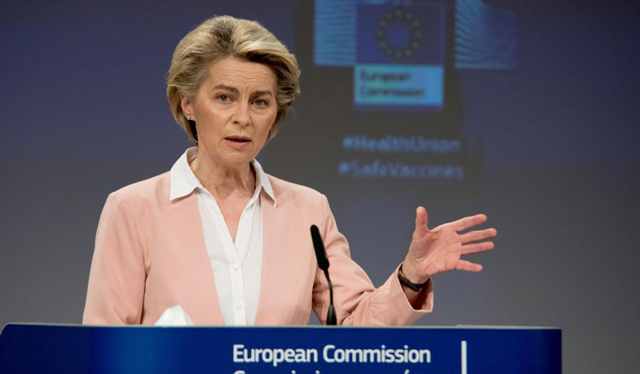
Rome, Italy | Xinhua | European Commission President Ursula von der Leyen said on Wednesday that the European Union (EU) will phase out Russian supply of crude oil within six months and refined products by the end of the year. However, Italy-based analysts said the move — if adopted — would likely have limited impacts in Europe and Russia.
Von der Leyen’s proposal did not address natural gas imports. The EU is the largest market for Russian natural gas exports, on which two of its largest economies — Germany and Italy — are highly dependent. France, the EU’s second largest economy, derives most of its electricity from nuclear power.
“Replacing petroleum imports will be much easier than replacing natural gas imports,” Eugenio Pinto, a professor of business administration at the Department of Economics of Rome’s LUISS University, told Xinhua. “Petroleum shipments are much more mobile than gas shipments and there are more sources for supply.”
Javier Noriega, a senior economist with Hildebrandt and Ferrar in Milan, agreed: “The main value of this move is symbolic,” he told Xinhua.
However symbolic, von der Leyen’s proposal is already creating divisions among the EU member states. Hungary and Slovakia have already said they would not comply and, according to media reports, they will be given an extra year to follow the other 25 member states’ suit.
The EU member states have independently established timetables for reducing imports of Russian gas, something Pinto said would have to be calculated carefully.
In March, the Union committed to reducing gas imports by two-thirds by the end of this year, and ending its dependence on Russian fossil energy entirely by 2030, though those plans did not include commitments for individual nations.
“Countries have to be careful to balance what they want to do with what they realistically can do,” Pinto said. “If countries reliant on Russian gas were forced to suspend their imports on the same timetable as the one suggested for oil imports, we’d see gas rationing for businesses and families, and economic recovery would grind to a halt.”
Pinto also noted that markets for its petroleum will be easier for Russia to replace than markets for its gas would be.
“Petroleum is pumped onto a cargo ship that can be sent anywhere,” he said. “But for gas, you need infrastructure, which means pipeline networks. That is much more limiting.”
Still, despite that, crude oil futures with a June delivery date surged on Wednesday, rising by more than 5 percent on what Noriega said was “speculation that supply issues would worsen.”
According to media reports, the EU has imported around 22 billion euros (23.2 billion U.S. dollars) worth of Russian fuel per month since the start of the Russia-Ukraine conflict.
Even though quantities have been reduced, rising oil and gas prices mean that the figure is nearly double the 12 billion euros worth of Russian fuel the bloc imported each month in 2021.
*****
Xinhua
The post EU’s proposed ban on Russian oil imports to have limited impact appeared first on The Independent Uganda:.
from WORLD – The Independent Uganda: https://ift.tt/920e8ZN
0 Comments